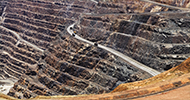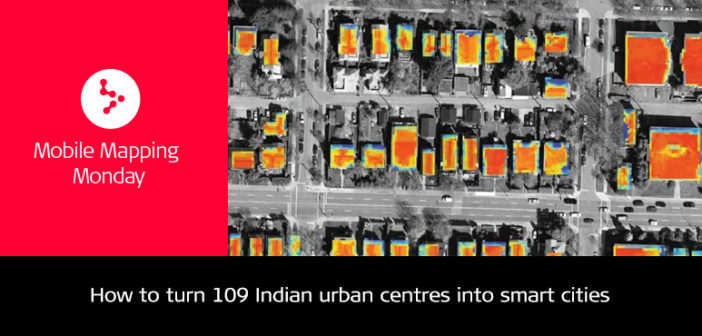The term ‘Smart City’ has become a buzzword. With many smart city projects underway or being launched the digitalisation of cities and the vision of urban development integrated with information and communication technology is expanding. Asset management, one of the ultimate milestones on the path to making a city smarter, requires clever geospatial data collection and analysis.
According to Rajendra Tamhane, SVP, Genesys International, a surveying firm involved in several smart city projects across India, geospatial data serves as the bed rock of any urban development plan. It includes accurate ground information represented in the form of maps and mixed reality 3D models. A reliable and accurate geospatial database is required to create and manage smart cities as well as serve as a revenue source for the city administrators.
 Let’s take India as an example… with its own smart cities programme which aims at upgrading 109 existing cities to smart cities, this emerging economy could rise to be a global leader in this domain, with about USD 2 trillion to be spent over the next 20 years to implement smart technologies. Currently, around 31% (around 377 million) of India’s population lives in cities, a number set to grow exponentially to 600 million by 2030, and by 2050, more than 50% of India’s population is forecasted to be urbanised. There are massive infrastructural challenges that the cities face, hampering the quality of life and driving the need for fast technological advancement.
Let’s take India as an example… with its own smart cities programme which aims at upgrading 109 existing cities to smart cities, this emerging economy could rise to be a global leader in this domain, with about USD 2 trillion to be spent over the next 20 years to implement smart technologies. Currently, around 31% (around 377 million) of India’s population lives in cities, a number set to grow exponentially to 600 million by 2030, and by 2050, more than 50% of India’s population is forecasted to be urbanised. There are massive infrastructural challenges that the cities face, hampering the quality of life and driving the need for fast technological advancement.
Genesys International, one of India’s leading geospatial survey and mapping companies, was tasked by the Indian government to provide the relevant geospatial data to complete the digitisation of the cities. In order to support this mega initiative, Genesys acquired a Leica Pegasus:Two. The surveying firm uses mobile LiDAR mapping, 3D rendering and visualisation, integrated with existing mapping systems into a common 3D enabled platform, providing a smarter spatially connected information network benefits citizens and enhance revenue generation for the city.
Typical geospatial applications for smart city projects
Rajendra Tamhane presented Genesys’ work at this year’s HxGN LIVE conference in Las Vegas, NV, and explained how geospatial solutions help smart cities to generate revenue through property taxes while optimising operations and maintenance costs with precise 3D maps for city roads and other infrastructures. The data also supports utilities to precisely map and layout their networks for better delivery of services. The wealth of information generated from 3D LiDAR based mapping combined with geospatial analytics will equip city planners and designers with the necessary tools to deal with complex challenges of the urban environments.


3D city mapping
- Merging and post-processing of high-density mobile LiDAR data from different capture solutions
- Extraction of features and building frontages from LiDAR point cloud data
- Generation of bare earth model and DTM from point cloud
- Preparation of above-ground utility map using point cloud data
- Creation of 3D modelling of building and texturing using processed point cloud data
Utilities mapping
- Utilities (electric, water, gas and telecom) are routinely tasked with collecting plant infrastructure data for routine inspection, network planning, engineering, asset management and to comply with safety standards
- Data collected in the form of 3D point clouds and 360 degree panoramic imagery helps in extracting accurately geo-referenced utility features and attributes to create vector layers
- LiDAR data helps distribution companies to plan and design by accurately measuring distance and taking reference of real ground situation using 360 panoramic imagery
- As-built documentation during construction process to validate project and keep the budget on track


Security and surveillance
- Traffic junction survey for flow management
- Plan and monitor entry and exit points of urban areas
- Railway station entry and exit point survey
- Survey and documentation of concerning road sections (accident prone areas)
- Accurate 3D capture of entry and exit points of schools, key residential areas, markets and jetties
- Planning of vital installations in the city
Transport networks
When large-scale roadway projects require reliable and high quality survey and engineering grade ground data, laser based technologies have proven to be the fastest and most accurate technology for mapping and modelling.
-
- Creation of precise and accurate ground information for planning, engineering and construction.
- Corridor design and monitoring
- Change detection
- Monitoring route and assets conditions
- Asset inventory
- Signage mapping
- Mapping obstructions on the right-of-way
- Tracking utilities along the route
- Assessment of potential areas for advertisement and other revenue generating concepts

Autonomous driving
Mobile mapping vans equipped with 360 degree cameras and LiDAR sensors with advanced data processing tools to convert reality into digital maps.
- 3D maps with gradient, slope, curvature and lane geometry
- Depth maps
- Advanced driver assistance systems
- Localisation and positioning for autonomous vehicles
- Critic data for calibration of vehicle platform sensors
LiDAR data paves the way to cost effectively gather accurate geospatial information equal to being in the real world. In order to make better and quicker decisions, smart city administrators need access to this information to allow them to monitor and improve their cities. They need a single source of information, which allows them to properly measure and analyse the performance of their assets, and make the right decisions, while keeping operations functioning and aligning regulations to citizen’s needs for an improved the overall quality of life.
About Genesys International
Genesys International is an advanced geospatial survey and mapping company with over two decades of experience in the geospatial industry. The firms mission is to be a global leader in providing geospatial technology enabled services such as GIS & LiDAR mapping, photogrammetry, IT consultation and customised business solutions. Headquartered in Mumbai, India, Genesys International has worked for government and enterprise customers, both locally as well as on an international scale. www.igenesys.com














